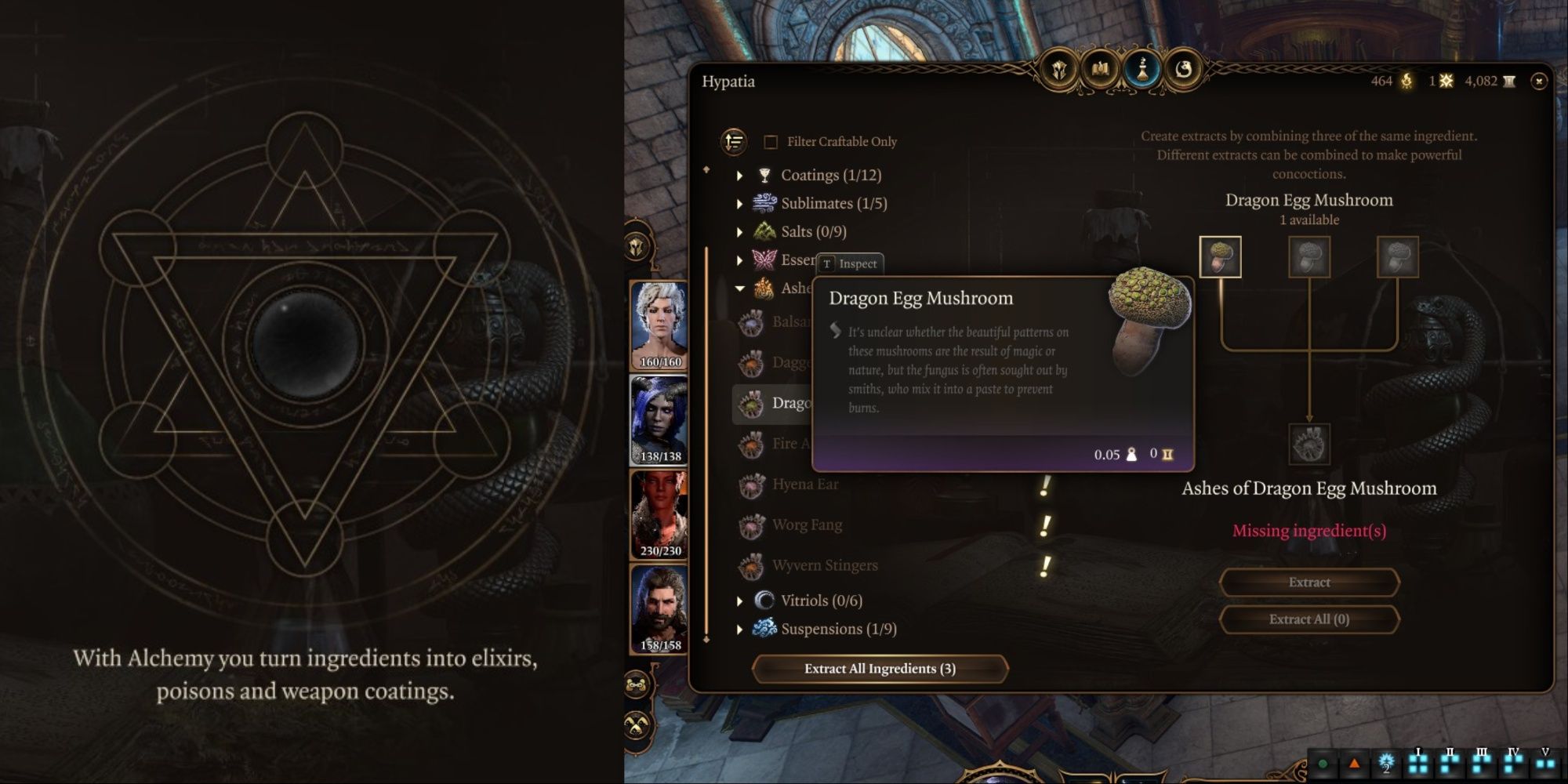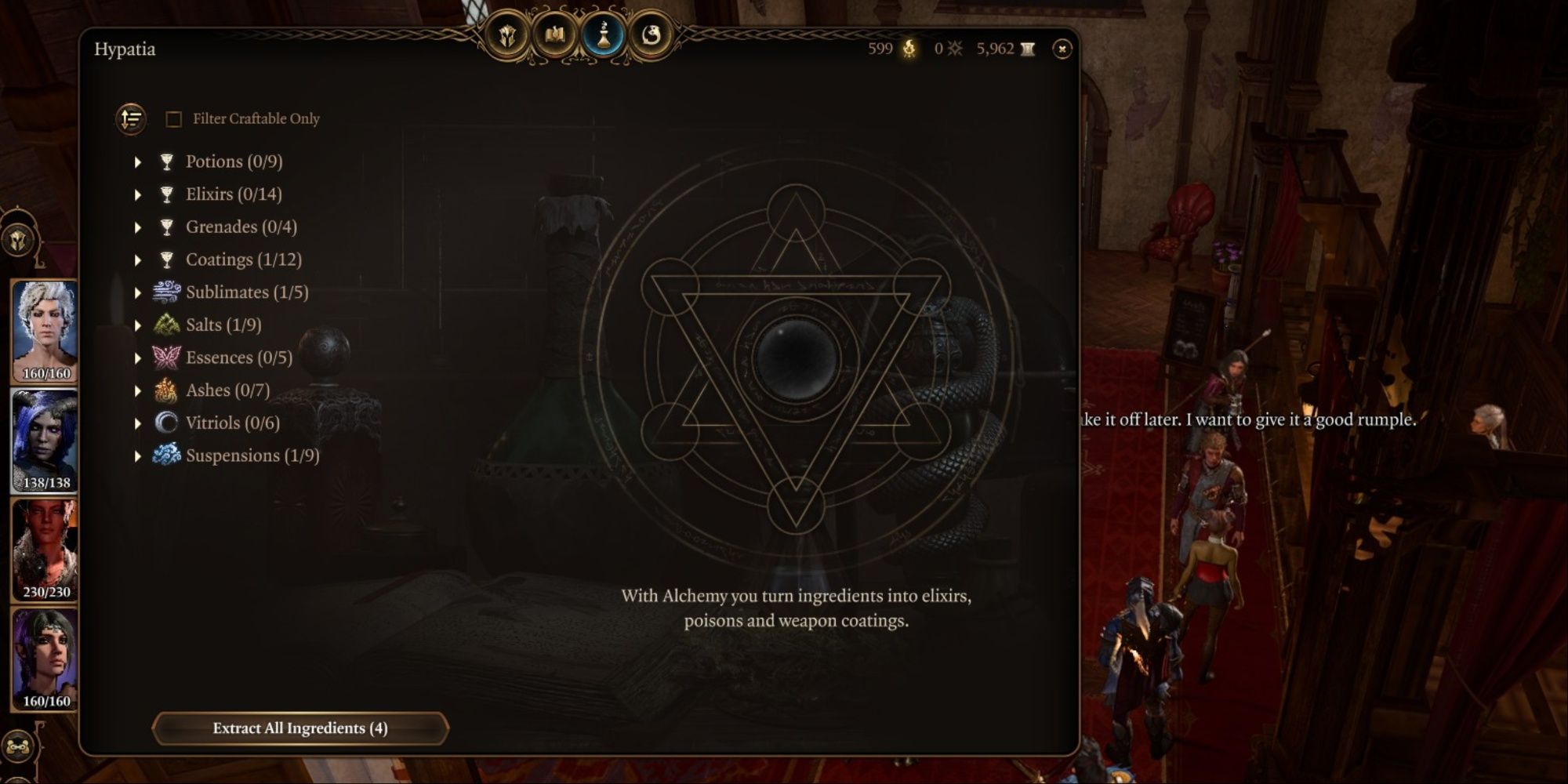Most of today's RPGs have a crafting element that includes a way for characters to make their own weapons, food, or potions. In Baldur's Gate 3, there's only one such profession available, Alchemy, and it be used to concoct a variety of useful materials beyond just the usual potions and elixirs.
Alchemy in Baldur's Gate 3 includes the usual potions and elixirs, along with an impressive array of other handy mixtures for explosives, weapon coatings, poisons, and grenades. They can also be purchased from vendors, but for those that have a lower Charisma and need to save their gold, it's better to understand the fine art of Alchemy.
Preparing Materials
Just like in real life, it's necessary to gather and prepare the raw materials before the player can make anything. It's easy for the various ingredients to fill up the player's inventory, which is why the game starts by giving everyone an Alchemy Pouch along with a Backpack and Keychain.
Finding Ingredients
The various plants, herbs, and mushrooms of the Sword Coast don't shine, glow, or sparkle like in other games, but they do stand out as colorful or distinctive plants. It's much easier to find ingredients in the wilderness, but they are abundant underground.
The Underdark, for example, has some of the rarest and most valuable plants and mushrooms. on the other hand, if the party is visiting a city, buy them from various vendors in cities and towns.
Unlocking Recipes
There are different ways to unlock Alchemy recipes in Baldur's Gate 3. Sometimes, all a character has to do is pick up a plant to learn any recipes associated with it. Recipes can also be discovered during the Alchemy process when refining raw materials into refined ingredients.
Another way to learn a recipe is to read it on a note, parchment, or book so that the player can interact with the environment. Some of these items are part of side or hidden quests.
There's no Alchemy Pouch equivalent for what the character makes with Alchemy, and those potions, grenades, and other handy items clutter up the bags. It's highly recommended that the player pick up another empty backpack or pouch and use that to store their creations.

Baldur's Gate 3: What Is the Rapture Buff and How to Get It
Here's everything that players need to know about the Rapture Buff in Baldur's Gate 3.
Alchemy Recipes
There aren't any level requirements for Alchemy in BG3, either for the character or for the skill itself. All the player needs is the right ingredients and the recipe to craft a variety of handy substances. Recipes are listed under types, with the consumables, explosives, and poison coatings listed first, followed by the finer ingredients for more complex potions.
Combining Ingredients
Two substances need to be combined to make a potion, elixir, grenade, or coating. One of these can be a raw material, but at least one other must be a refined ingredient.
Refining Ingredients
Three of any single substance are needed to make sublimates, salts, essences, vitriols, suspensions, or ashes. This is a rule of Alchemy in Faerun, which players can find in the same books that teach recipes or list ingredients.

Baldur's Gate 3: 7 Of The Hardest Side Quests
These are some of the most difficult side quests to clear in Baldur's Gate 3.
The Alchemy Tab
- Potions. This section includes the common potions that players often pick up or buy. Healing potions of all strengths are listed here, along with Speak With Animals and Feather Fall.
- Elixirs. These are the creations that either give characters resistance to damage, restore spell slots, or improve their stats.
- Grenades. Anything that the character can throw and explode on impact, like Alchemist's Fire. There are a lot of these in the game, but not all of them, though a few can be crafted.
- Coatings. These are variations on several different kinds of poisons, some of which prevent healing or lower resistance in addition to applying a DoT to the target.
- Sublimates. Combine three raw materials to make a sublimate, which in turn is used as an ingredient in higher-level potions and elixirs.
- Salts. Plants, fungi, and rocks are ground down or burnt into Salts, another base ingredient for more complex and stronger potions and elixirs.
- Essences. These are also often made of rocks or more uncommon substances and are used in potions and elixirs of rare or very rare quality.
- Ashes. A common ingredient in several potions of both high and low levels.
- Vitriols. These are derived from fungus, rocks, or human organs, either found on undead bodies. They're more difficult to acquire and are used in higher-level potions.
- Suspensions. Derived from rare and even dangerous ingredients like Gauth Eyestalk and used in high-level concoctions.
Potions are stored in the Inventory of the character who makes them. One party member can make everything, but that makes distributing them among the companions more time-consuming. Switching characters during this process ensures that every party member has an equal amount.
Baldur's Gate 3 is available for PC and PlayStation 5. A version for Xbox Series X|S is currently in development.





